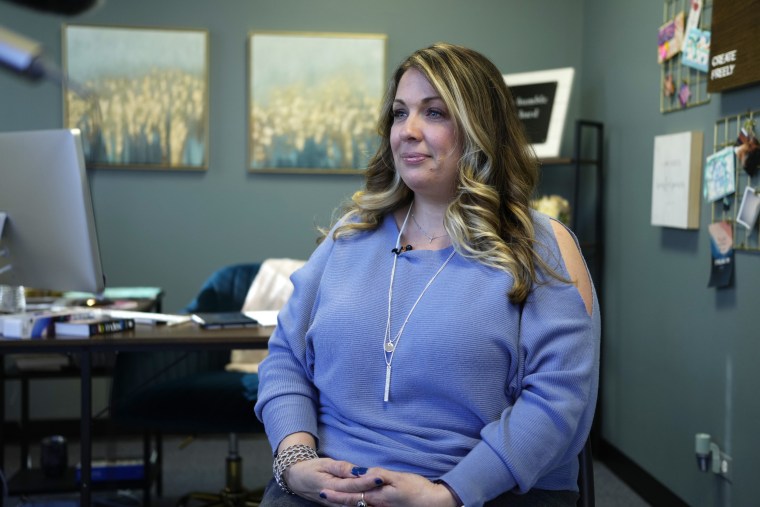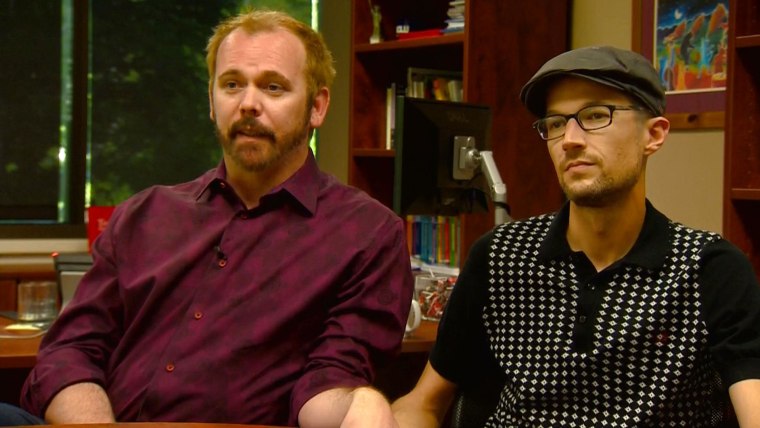
WASHINGTON — The Supreme Court on Monday hears the latest clash between religious conservatives and LGBTQ rights as it weighs a conservative evangelical Christian web designer’s bid to avoid working on same-sex weddings.
Lorie Smith, who opposes same-sex marriage on religious grounds and runs a business in Colorado designing websites, is seeking an exemption from a state law that outlaws discrimination on the basis of sexual orientation in public accommodations.
Smith sued the state in 2016 because she said she would like to accept customers planning opposite-sex weddings but reject requests made by same-sex couples wanting the same service. She argues that, as a creative professional, she has a free speech right under the Constitution’s First Amendment to refuse to undertake work that conflicts with her own views.

Civil rights groups say Smith is asking the conservative-majority court for a “license to discriminate” that would gut public accommodation laws that require businesses to serve all customers.
The case is a latest example of the conflict over the Supreme Court’s own 2015 ruling that legalized same-sex marriage, which conservative Christians oppose even as Congress has moved to enact a law with bipartisan support that bolsters protections for married same-sex couples.
Smith, whose business is called 303 Creative, told NBC News she has always been drawn to creative projects but also has strongly held beliefs that “marriage is between one man and one woman — and that union is significant.”
Smith sued the Colorado Civil Rights Commission and other state officials out of concern that she could be sanctioned under its antidiscrimination law that bars discrimination on the basis of sexual orientation in public accommodations. Lower courts ruled against Smith, prompting her to appeal to the Supreme Court.
The case gives the Supreme Court, which now has a 6-3 conservative majority, a second bite at a legal question it considered but never resolved when it ruled in a similar case in 2018 in favor of a Christian baker, also from Colorado, who refused to make a wedding cake for a gay couple. The court ruled then that the baker, Jack Phillips, did not receive a fair hearing before the state Civil Rights Commission because there was evidence of anti-religious bias.
The 2018 ruling left undecided the broader question now at issue in Smith’s case. If the court rules in favor of Smith, certain business owners would effectively have an exemption from elements of laws in 29 states that protect LGBTQ rights in public accommodations in some form. The remaining 21 states do not have laws explicitly protecting LGBTQ rights in public accommodations, although some local municipalities do.
Civil rights groups say that a ruling along those lines would undermine the entire purpose of antidiscrimination laws.
State officials have said in court papers that they never investigated Smith and had no evidence that anyone had ever asked her to create a website for a same-sex wedding. Colorado Solicitor General Eric Olson wrote that there is a long tradition of public accommodations laws protecting the ability of all people to obtain goods and services.
Smith, like Phillips before her, is represented by Alliance Defending Freedom, a conservative Christian legal group, which has had success arguing religious rights cases at the Supreme Court in recent years. The court ruled on the baker case before the retirement of Justice Anthony Kennedy, who voted in favor of LGBTQ rights in key cases. Now, following three appointments made by former President Donald Trump, the court has six conservative and three liberal justices.
Kennedy was in the majority when the court legalized gay marriage on a 5-4 vote. In another major victory for LGBTQ rights, the Supreme Court in 2020 — to the surprise of many court-watchers — ruled that a federal law that prohibits sex discrimination in employment protects LGBTQ employees.
A year later the court ruled in favor of an agency affiliated with the Catholic Church that the city of Philadelphia had barred from its foster care program because of the church’s opposition to same-sex marriage. In other cases in recent years the conservative majority has consistently backed religious rights.

 Latest Breaking News Online News Portal
Latest Breaking News Online News Portal





